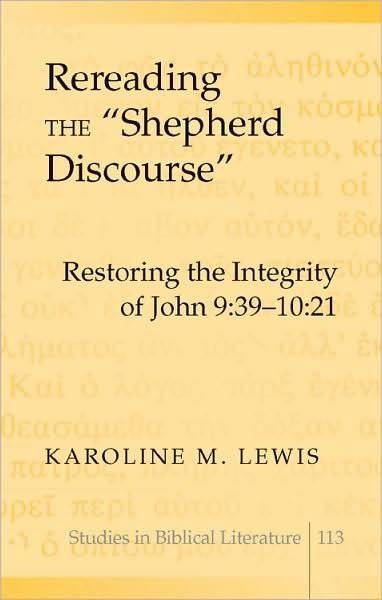
Wil je zeker zijn dat je cadeautjes op tijd onder de kerstboom liggen? Onze winkels ontvangen jou met open armen. Nu met extra openingsuren op zondag!
- Afhalen na 1 uur in een winkel met voorraad
- Gratis thuislevering in België vanaf € 30
- Ruim aanbod met 7 miljoen producten
Wil je zeker zijn dat je cadeautjes op tijd onder de kerstboom liggen? Onze winkels ontvangen jou met open armen. Nu met extra openingsuren op zondag!
- Afhalen na 1 uur in een winkel met voorraad
- Gratis thuislevering in België vanaf € 30
- Ruim aanbod met 7 miljoen producten
Zoeken
€ 101,45
+ 202 punten
Omschrijving
The history of scholarship narrates a complicated past for the interpretation of the «Shepherd Discourse» in the Fourth Gospel. Both the internal and contextual integrity of John 9:39-10:21 have been compromised by a misapplied analogy dividing the passage into a parable and explanation structure, and by reading models that favor historical approaches. As a result, the images and figures encountered in the discourse have not been allowed their full imaginative impact and the tendency is to look outside the Gospel for their referents and explanations. The meaning of the «Shepherd Discourse» lies not in its relation to the rest of the Fourth Gospel, but to that which is imported into the narrative. Moreover, its function as the discourse to chapter 9, and in the whole of the Gospel, is overlooked.
Lewis employs the strategy of rereading, borrowed from literary theory, to address the internal integrity of the discourse and the relationship of the discourse to the rest of the narrative. The literary phenomenon of rereading highlights the interconnectedness of the whole of the discourse and allows all of the imagery to be assessed at a figurative level. Rereading also foregrounds the function of John 9:39-10:21 as the discourse to the healing of the blind man in chapter nine, and calls attention to the importance of the «Shepherd Discourse» for the interpretation of the Fourth Gospel, especially the often-ignored image of Jesus as the door. This book suggests that rereading is necessitated by the Gospel itself as a fundamental feature of its unique theological expression.
Lewis employs the strategy of rereading, borrowed from literary theory, to address the internal integrity of the discourse and the relationship of the discourse to the rest of the narrative. The literary phenomenon of rereading highlights the interconnectedness of the whole of the discourse and allows all of the imagery to be assessed at a figurative level. Rereading also foregrounds the function of John 9:39-10:21 as the discourse to the healing of the blind man in chapter nine, and calls attention to the importance of the «Shepherd Discourse» for the interpretation of the Fourth Gospel, especially the often-ignored image of Jesus as the door. This book suggests that rereading is necessitated by the Gospel itself as a fundamental feature of its unique theological expression.
Specificaties
Betrokkenen
- Auteur(s):
- Uitgeverij:
Inhoud
- Aantal bladzijden:
- 217
- Taal:
- Engels
- Reeks:
- Reeksnummer:
- nr. 113
Eigenschappen
- Productcode (EAN):
- 9781433101908
- Verschijningsdatum:
- 5/02/2008
- Uitvoering:
- Hardcover
- Formaat:
- Genaaid
- Afmetingen:
- 160 mm x 230 mm
- Gewicht:
- 529 g

Alleen bij Standaard Boekhandel
+ 202 punten op je klantenkaart van Standaard Boekhandel
Beoordelingen
We publiceren alleen reviews die voldoen aan de voorwaarden voor reviews. Bekijk onze voorwaarden voor reviews.











